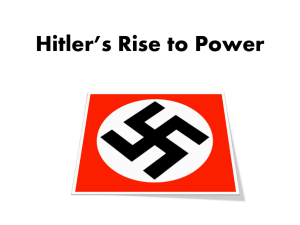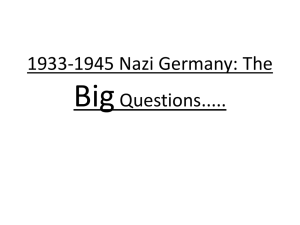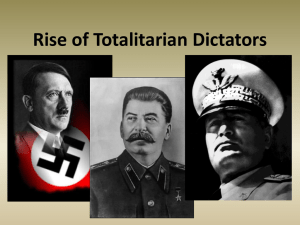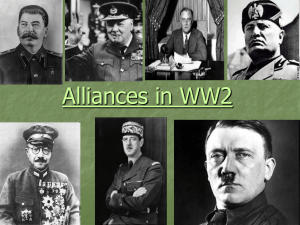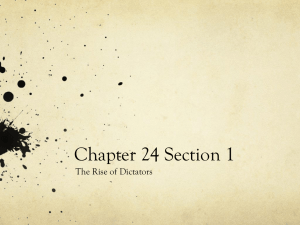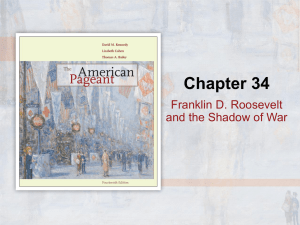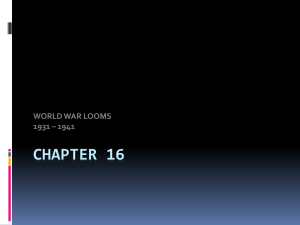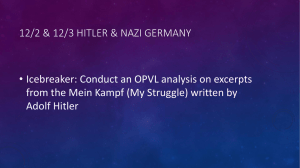Hitler and the Rise of the Nazis
advertisement
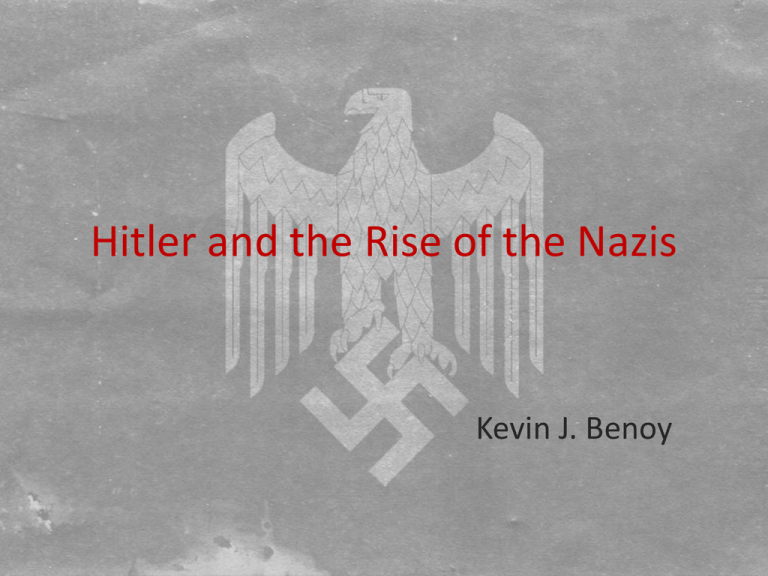
Hitler and the Rise of the Nazis Kevin J. Benoy Hitler’s Early Life • 1889 at Hitler was born on April 20, at Baunau, a small village in Austria, near the Germany border. Adolf Hitler’s Early Life • Successful at his small village school, |Hitler did only indifferently after his family moved to Linz. • His father died when he was 13. Alois Hitler, Adolf`s father Hitler`s Early Life • Two years after completing school (at age 15), Hitler moved to Vienna, hoping to study at the Academy of Fine Arts. • He failed the entrance examination, but remained in the capital, hoping to apply again. • He continued to draw and paint and took an interest in History and Architecture. Hitler`s Early Life • In Vienna, the AustroHungarian Empire`s multi-racial capital, Hitler became involved in the Pan-German Movement – founded in reaction to the growth of Pan-Slavism. • This group was antiSemitic, anti-socialist and anti-Catholic. Hitler`s Early Life • Hitler was particularly impressed with the work of such historians as Treitschke, who said ``the Jews are our misfortune.`` Heinrich von Treitschke Hitler`s Early Life • He never won acceptance into the Academy, but did remain in Vienna. • In Mein Kampf he described this time as the unhappiest in his life – not because of poverty but because: Vienna with its promiscuous swarm of foreign races, Czechs, Poles, Croats and the like, all of them battening on that old nursery of German culture – and in addition, the Jews-germ carriers infecting the whole of society, to be found here, there and everywhere. Hitler`s Early Life • To avoid conscription, and having to serve alongside non-Germans, Hitler moved to Munich, in Germany. • He was happy here, in ``a city purely German in population and architecture, and furthermore immune to the alien canker eating into the heart of the Austrian Empire.`` World War I • Caught up in the enthusiasm of the time, Hitler enlisted in the German army in August, 1914. • He served throughout the war in a Bavarian regiment – rising only to the rank of corporal.. • He was wounded in action and was awarded the Iron Cross, first class. • He found fulfillment in the army, enjoying life at the front. Pro-war rally in Munich, August, 1914 War`s End • The end of the war came as a blow to Hitler. • When the war ended, he was hospitalized – temporarily blinded from gas at Ypres. • Reporting back to his unit in Munich, he faced demobilization, but was given the task of reporting on a new political party: the National Socialist German Worker`s Party (NSDAP). Early Years in the NSDAP • Rather than just report on the Party, Hitler went so far as to become its leader, turning it into a party capable of drawing crowds of up to 2,000 at political meetings • He also worked with the Education Department of the army, lecturing returning soldiers on the dangers of Communism and Socialism – and of how the Jews stabbed Germany in the back. • He had a talent for oratory. Beer Hall Putsch • Hitler, like Lenin, set out to capture the masses. • Using his gift for public speaking, pageantry (uniformed followers, banners, flags, marching songs and rhythmic chanting of slogans) – as well as his private army of political thugs – the SA, or brownshirts, who beat up hecklers – Hitler created a party base in Munich. Policies • His party’s demands were characteristic of nationalist groups at the time, calling for: – Abrogation of the Treaty of Versailles. – Anschluss (Union) with Austria. – Removing the citizenship rights of Jews. Policies • In addition, the party held some leftist views: – Nationalization of all department stores. – Banning speculation. – Abolition of unearned income. • Consequently, the Nazis could appeal to all levels of society. Beer Hall Putsch • With the support of General Ludendorff, Hitler attempted to take advantage of popular unhappiness over the Ruhr occupation, to overthrow the state government of Bavaria on November 9, 1923, in preparation for a march on Berlin. Beer Hall Putsch • Hitler heard that politicians and businessmen were meeting in the huge Buergerbräukeller – a typically large beer hall. • Hitler burst into the meeting, with armed followers and, after firing a shot to get attention, declared that the revolution had begun. Beer Hall Putsch • With most of the Bavarian government held hostage, Hitler, Ludendorff and other followers set off to join Ernst Roehm and his men, who seized the War Ministry. • The failure of the Nazis to seize telegraph and radio locations proved fatal. Beer Hall Putsch • Alerted to the trouble, the national government ordered security forces to act and Bavaria police also moved into position. • On the 10th of November, Hitler, Ludendorff and 3,000 supporters faced off against the Bavarian police at Odeonsplatz. • Shots were fired. 21 were killed and a further 100 wounded. Beer Hall Putsch • Hitler and the Nazis ran. • Ludendorff was arrested. • After a few days in hiding, Hitler was also arrested and faced trial for high treason. – Ludendorff was acquitted. – Hitler was sentenced to only 5 years in Landsberg prison. Beer Hall Putsch Hitler and colleagues in Landsberg Prison. • In the end he served only 9 months – in relative comfort. • Here, he wrote the first draft of Mein Kampf. • He also realized that the path to power could not come by way of a coup, so long as the Reichswehr stood against him. The later 1920’s • The party had notoriety, but little electoral support in the 1920s as Weimar Germany recovered from the Ruhr debacle and prosperity returned. • It even looked like the party would split on left/right lines as Hitler and Gregor Strasser quarreled over policies The Later 1920s • A new recruit, Josef Goebbels, brought mastery of propaganda to the party and helped Hitler reunify the party. Nazi Organizations • Another significant development involved the formation of youth movements to indoctrinate young people, including the Hitler Youth – a recruiting ground for future SA members. • The German Labour Front provided a Nazi alternative to the Social Democratic and Communist labour unions. The Reichsparteitag • Hitler understood the power of pageantry. • He introduced the Reichsparteitag – the party rally – in which paramilitary reviews and torchlight processions created a feeling of Nazi pride. • Hitler said “mass demonstrations must bring it home to the little man’s mind that although he is only a petty worm, he is, nevertheless, part of a great dragon.” Electoral Failure • In the 1928 elections, 12 Nazis were elected on the basis of 800,000 votes nationally. • This paled in comparison with the 9 million votes of the Social Democrats, or even the 4 million votes of Hugenberg’s Conservative National Party. • However, it did indicate a significant core support. Political Scheming • Stresemann’s adherence to the Kellog-Briand Pact and the acceptance of the Young Plan were both condemned by Hitler. • Hitler allied himself with Hugenberg and was introduced to powerful backers, including Fritz Thyssen, the steel magnate. Hitler and Thyssen Disasters • On October 3, 1929, Stresemann died. Weimar Germany lost its strongest proponent. • Three weeks later, the Wall Street Crash also brought collapse of the German economy. – American loans dried up immediately. – Unemployment followed. Unemployment • In September 1929 unemployment stood at 1,300,000. • In September 1930 it rose to 3,000,000. • By September 1932 it was 5,100,000. • By January 1933 it stood at 6,000,000 – fully 1/3 of all German adult males. • The German labour movement, a strong supporter of the Republic, was now divided between the workers and the workless. Political Fallout Herman Mueller • The Socialist Chancellor, Mueller, tried to raise additional funds for unemployment relief, but could not find enough support in his coalition. • He turned to the conservative President, requesting emergency powers to deal with the situation – but was refused. Political Fallout • On the advice of General Kurt von Schleicher, Hindenburg forced Mueller to resign, appointing conservative Heinrich Bruening in his place. • The Social Democrats were asked to approve budget cuts, but refused. • Bruening’s proposals were defeated. Political Fallout • Bruening turned to Hindenburg, requesting emergency powers – which were granted this time. • The deficit was reduced at the expense of the unemployed and old age pensioners. • When the Reichstag protested, Bruening dissolved it and called for new elections. Heinrich Bruening Nazi Breakthrough • The Nazi seat total rose from 12 to 107. • The Social Democrats were still the largest party at 143, but they lost votes to he Communists (77 seats) and the Nazis. • Hugenberg supporters began to move to the Nazis too. Political Chaos • Street fighting between the Red Fighters (Communist thugs), the Stahlhelm (National Party thugs) and the SA brownshirts continued unabated. Political Chaos • Bruening continued to govern for 2 more years – but only through using emergency powers granted under Article 48 of the constitution. • Meanwhile Nazis took control of several state governments. Harzburg Front • In October, 1931, through intermediary Hjalomar Schacht, a financier, the Harzburg Front was formed, allying the Nazis, Hugenberg’s Conservatives and a number of Rhineland industrialists. • The proclaimed themselves ready to seize power. Harzburg Front • In this more radical atmosphere, Hindenburg, who had been considered a right wing candidate when he ran for office in 1925, was now seen as a moderate in the election of 1932. • He told his friend, Franz von Papen, “now I have been chosen by the Let, whereas the Right, my own people, have put up this Lance Corporal.” 1932 Presidential Election • The election took two rounds to conclude. – Hitler received 11.3, then 13.4 million votes. – Hindenburg won 18.6, then 19.3 million votes. • By now Nazis and Communists, the two parties openly favouring an end to the Weimar republic ,dominated the Reichstag. Bruening’s Gambit • Bruening continued to govern, but only because of the support of a senile 84 year old President. • Acting boldly, Bruening banned Hitler’s SA and SS. • This action led to his downfall. Bruening’s Fall Franz von Papen • Von Papen, a friend of Schleicher and Hindenburg, sought to put together an alliance to keep Hitler from power, but to do so, he made a bargain with Hitler to end the ban on the SA and SS in return for support of a Papen government in the Reichstag. Franz von Papen • Von Papen became chancellor but could not cope with events that followed. – Street fighting continued. – Von Papen reacted with dictatorial measures. • New elections brought greater Nazi success – 13.7 million votes and 230 seats. Nazi Tactics • Once again the Nazis considered launching a coup d’etat, but Hitler, fearing the Reichswehr, agreed with Goebbels that a pseudo-legal entry into government was needed. • On the one hand the Nazis attacked von Papen for his dictatorial use of Article 48. On the other hand they openly used terror tactics in the streets. Internal Division • Internal trouble once again threatened to split the Nazis as Strasser again broke with Hitler over Hitler’s refusal to introduce more socialist policies & because of Hitler’s ties to big business. • Von Papen called for fresh elections, hoping to profit from Nazi divisions. Schleicher Rules • The Nazis lost 2 million votes and 34 seats – but none of the moderate parties gained strength and 1.4 million fewer voters turned out. • Hindenburg offered the Chancellorship to Hitler then withdrew the offer when Hitler demanded unlimited power. • Von Papen asked that he be allowed to govern without the Reichstag – but was refused. • A new cabinet was formed by Schliecher – but it lasted only 2 months. Schleicher Rules • Schleicher convinced Hindenburg he could bring Strasser and the bourgeois parties into an anti-Hitler alliance. He was determined to defend the Reichswehr against the threat of Hitler’s personal forces, the SA and SS. General Kurt von Schleicher Hitler Comes to Power • Hitler countered Schleicher easily. – The masses were with him, not the general. • The economic crisis undermined all governments and all political leaders plotted and counter-plotted. • In the end, Von Papen toppled Schleicher by striking a bargain with Hitler, who agreed to abandon his demand for unlimited power and enter into a coalition cabinet with Papen, Hugenburg and other conservatives. • Hindenburg appointed Hitler Chancellor on January 1, 1933. Hitler Comes to Power • Hitler came to power legally and with the support of more of the German people than any other leader of his time could muster. • However, his rise was not entirely democratic. • German democracy was seriously undermined by the economic crisis. Hitler Comes to Power • Weimar democracy had been debased from the moment when Hindenburg allowed Bruening to govern under the provisions of Article 48. • In addition, elections were held in an atmosphere of terror directed by the extremists of the Left and Right. • Though in power, there was no guarantee he could remain there. Hitler’s First Days • Hitler’s first cabinet reflected the Harzburg Front – with 3 Nazis and 9 independent conservatives, including von Papen. • Hindenburg felt the Nazis could be tamed, though a massive torchlight parade that night hinted otherwise. Hitler’s First Days • Two days later, Hitler called on the German people to “give us four years and then judge us.” • He dissolved the Reichstag and called for new elections in March, hoping to gain the 2/3 majority needed to change the constitution. 1933 Election • Goering used the Prussian police and the SA to soften up voters for the election. • Nazi terror was unleashed. • On February 27, the Reichstag buildings burned down. Goebbels and Goering claimed the KPD were behind the arson. 1933 Election • Hitler persuaded Hindenburg to pass “Ordinances for the protection of the German state and nation...as defense against communistic acts of terror endangering the state.” • Civil liberties were stripped: – Freedom of speech, press and liberties were lost. – Postal secrecy was surrendered. – Habeas corpus and the inviolability of home and property was stripped. • Opposition newspapers were closed and opponents jailed. 1933 Election • Despite the terror, only 44% supported the Nazis. • Even in coalition with conservative allies, Hitler lacked the 2/3 majority he needed. • However, Hitler continued to rule under the emergency provisions. Establishment of a Police State • Concentration camps were established and opponents disappeared to be tortured or killed. • The Enabling Act of March 1933 deprived the Reichstag of real power. – Now Hitler made laws without the approval of Parliament, even if they violated the constitution. – The law was to be in place for 4 years. – All of the Centrist parties supported it and only 94 of the 120 Social Democrats opposed it. The 81 Communists could not vote. However, belligerent and uniformed Nazis filled the Reichstag instilling fear in their opponents. Establishment of a Police State • Hitler used the act to transform the country. • Soon the Socialist and Center parties were dissolved. Hugenburg’s party disbanded voluntarily. • A new law of July 14, 1933 made the NSDAP the only legal party in Germany Establishment of a Police State • Germany was transformed from a federal to a unitary state. • Cabinet votes were eliminated. • Non-Aryans (Jews) were dismissed from all government jobs. • Strikes were forbidden, and all unions abolished, replaced by the All-German Labour Front – a Nazi organization. • Education and culture came under the scrutiny of Goebbels and were purged of “politically unreliable” elements. Establishment of a Police State • When another election was held in November, 1933, the NSDAP took 92.2% of the vote. • Only 3.4 million Germans dared vote against it – and their ballots were traceable, though they did not know it at the time. Establishment of a Police State • There remained only one group in Germany that could challenge Hitler – the army. • The old, aristocratic, conservative General Staff distrusted Hitler, fearing that he intended to replace the army with the SA and SS. Establishment of a Police State • Hitler decided to cut a deal with the Reichswehr. • The SA leader, Ernst Roehm had become something of an embarrassment to Hitler. • Other Nazis, like Strasser, were also suspect. Establishment of a Police State • Hitler unleashed the SS on the brownshirts in return for an army promise to stay out of politics. • Roehm, Strasser, Schleicher, prominent Catholics, monarchists and others were executed. • Von Papen was arrested,but not shot. • 74 officially died, though the unofficial total was around 1,000. Der Fuhrer • Two months after the Night of the Long Knives Hindenburg died. • Hitler combined the posts of Chancellor and President. • The new Reichswehr loyalty oath was to Hitler himself. finis


